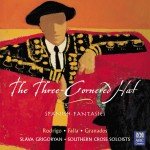Lis Gasteen, soprano
West Australian Symphony Orchestra
Simone Young, conductor
ABC Classics 476 6811
TPT: 73’41”
reviewed by Neville Cohn
Let it be said at once that soprano Lisa Gasteen is ideally suited to this repertoire. She has those qualities of heart and mind essential to essay works of this kind – and she has, crucially, the ability to effortlessly ride the crest of the accompanying orchestral wave no matter how substantial that might be. I especially admired the skill and expressiveness with which she sang Traume, the first of Wagner’s famous Wesendonck Lieder, with a gently pulsing accompaniment a fine counterpoint to the vocal line. At cycle’s end, incidentally, Traume is repeated, this time with the vocal line played with commendable sensitivity by violinist John Harding who, at the time, was concertmaster of the WASO. Gasteen is equally convincing in three of Richard Strauss’ lieder: Zueignung, Heimliche Aufforderung and Allerseelen. Stylewise, they are beyond criticism.
For this listener, however, the chief joy of this recording – and this is said with all due acknowledgement of Gasteen’s formidable artistry – is the quality of string playing of the West Australian Symphony Orchestra. In this sense, the most rewarding offering of the compilation is a splendidly presented Prelude to Wagner’s Tristan and Isolde.
Here, the strings are in particularly memorable fettle, producing a uniformity of tonal sheen that lifts the performance to a special category of excellence. Here, as throughout, Simone Young presides over events with wondrous skill as she coaxes her forces to ever more meaningful effect, not least in finely sustained phrase lines. This is yet another demonstration of Young’s quite extraordinary ability to take her forces to levels which, in the ordinary course of events, the players themselves might have considered unattainable.
This was such persuasive playing that, if the shade of Wagner himself had hovered over the proceedings, it might well have nodded its approval of both Young and the WASO. There is also a thoroughly worthwhile performance of Strauss’ Metamorphosen.


